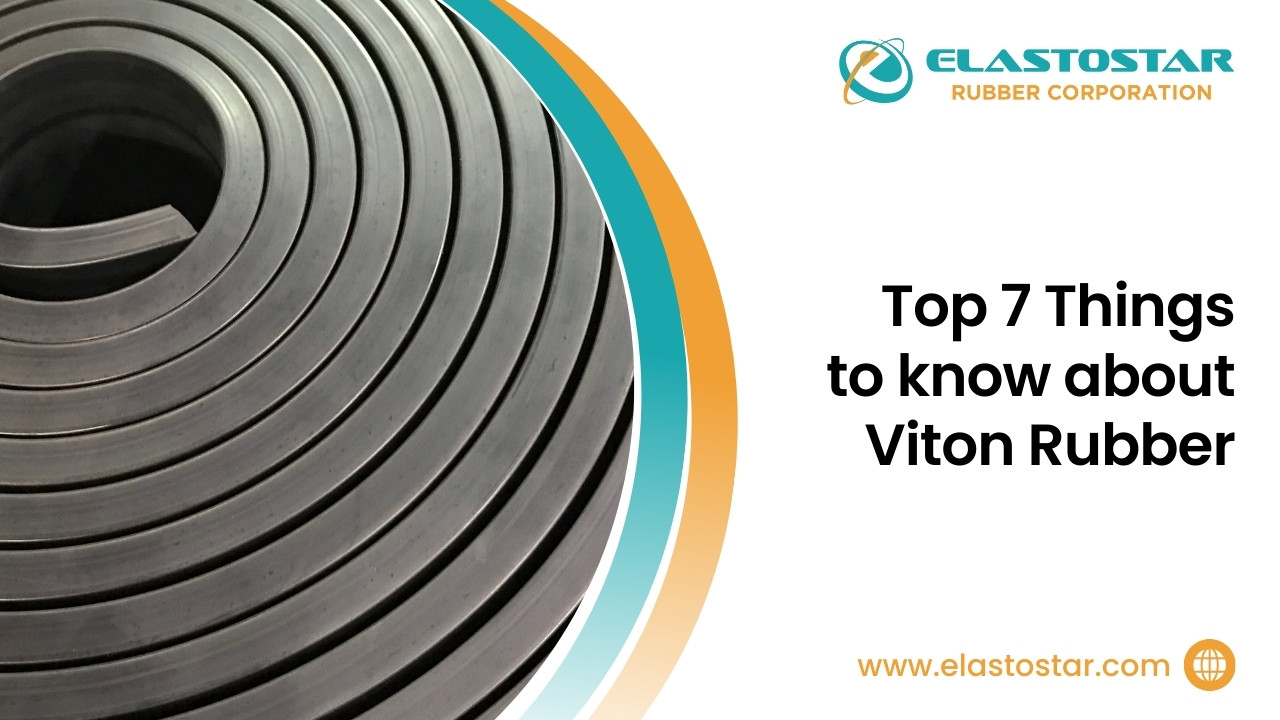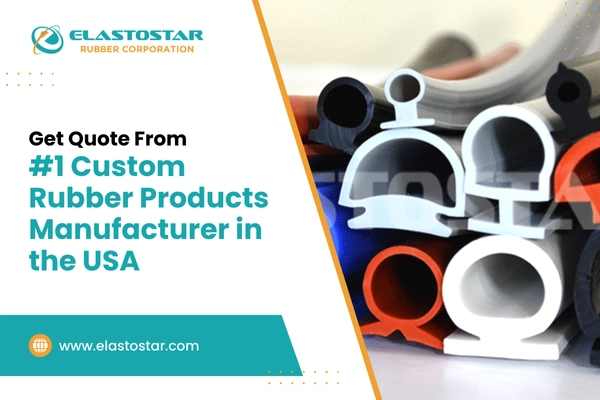Viton rubber is a high-performance fluoroelastomer known for its exceptional durability, chemical resistance, and versatility in industrial applications. Its unique properties make it a preferred choice for demanding environments such as automotive, aerospace, and chemical processing industries.
This blog explores the Top 7 Things to Know About Viton Rubber, including its key properties, uses, advantages, and how it compares to other elastomers.
Understanding these aspects will help you make informed decisions about its suitability for your specific needs.
Table of Contents
Top 7 Things to know about Viton Rubber
1. What is Viton Rubber?
Viton rubber is a type of fluoroelastomer, a synthetic rubber known for its outstanding resistance to chemicals, high temperatures, and environmental degradation. Its chemical composition, rich in fluorine, gives it superior performance compared to many other elastomers.
Introduced in the mid-20th century, Viton rubber has become a trusted material for demanding applications in industries like automotive, aerospace, and chemical processing. Its unique blend of properties makes it ideal for O-rings and other sealing solutions.
Learn more about different elastomers in our blog on What is the Difference Between EPDM and Silicone Rubber?
2. Properties of Viton Rubber
Viton rubber is renowned for its unique set of properties, making it indispensable in various demanding applications.
| Property | Description |
| Chemical Resistance | Exceptional resistance to oils, fuels, aggressive solvents, and most industrial chemicals. |
| Temperature Stability | Operates effectively in extreme temperatures ranging from -20°C to 200°C without degradation. |
| Mechanical Strength | Durable, elastic, and highly resistant to wear, tear, and physical stress. |
| Compression Set | Maintains its shape and sealing ability under prolonged pressure and compression. |
| Environmental Resistance | Withstands UV rays, ozone, and harsh weather conditions without losing its performance. |
| Aging Resistance | Retains properties over time, even in prolonged use or storage. |
| Low Permeability | Provides excellent resistance to gas permeation, making it ideal for fuel and fluid systems. |
Learn about What Are the Advantages of Silicone Rubber?
3. What are the Common Applications of Viton Rubber?
Viton rubber is widely used across various industries due to its exceptional durability, chemical resistance, and ability to perform under extreme conditions.
- Automotive Industry: Viton rubber is commonly used in fuel systems, seals, and gaskets to handle high temperatures and harsh chemicals effectively.
- Aerospace Applications: Its reliability under extreme conditions makes it ideal for O-rings, high-performance seals, and other critical components.
- Industrial Uses: Extruded rubber products made from Viton are extensively applied in pipelines, heavy machinery, and chemical processing systems for reliable sealing.
- Chemical Processing: Perfect for equipment exposed to aggressive solvents, acids, and high-pressure environments.
- Oil & Gas Industry: Frequently used in custom rubber extrusions and components that handle fuels, oils, and corrosive chemicals.
For more insights, explore Top 8 Benefits of Rubber Seals & Gaskets for Industrial Applications
4. How Does Viton Rubber Compare to Other Elastomers?
Viton rubber stands out when compared to other elastomers due to its unique combination of properties, making it a preferred choice for demanding applications.
- Viton vs Nitrile Rubber
Viton A and Viton B grades offer superior chemical and temperature resistance, especially in environments exposed to fuels and aggressive solvents. However, Nitrile rubber is more cost-effective and is often selected for less demanding applications. - Viton vs Silicone Rubber
While Silicone rubber performs well in high-temperature applications and is more flexible, Viton outperforms it in mechanical strength, wear resistance, and chemical durability. Viton is better suited for industrial uses that require robust sealing and durability. - When to Choose Viton Rubber
Viton is the ideal choice for high-performance products like custom rubber molded parts and custom rubber gaskets, particularly when made by leading extruded rubber manufacturers. It’s commonly used in industrial and automotive systems requiring long-term reliability under extreme conditions.
5. What are the Advantages of Using Viton Rubber?
Viton rubber is a trusted material for challenging environments, offering these key advantages.
- Durability in Harsh Conditions: Resistant to extreme temperatures, chemicals, and environmental factors like UV and ozone.
- Chemical Resistance: Performs exceptionally well against fuels, oils, and solvents, making it ideal for industrial and automotive applications.
- Cost Efficiency: Its long lifespan reduces maintenance and replacement costs over time.
- Versatility: Used across industries such as automotive, aerospace, and chemical processing for reliable sealing and performance, including custom rubber seals and extruded rubber products
6. Limitations of Viton Rubber
While Viton rubber offers exceptional performance, it does have a few limitations.
- Higher Upfront Costs: Viton rubber is more expensive compared to other elastomers like Nitrile, which may not make it the best option for cost-sensitive applications.
- Environmental Concerns: Due to its chemical composition, including the Viton chemical formula, recycling and disposal can be challenging, raising sustainability issues.
- Specific Product Requirements: In some cases, specialized solutions such as a d shaped rubber seal or products made by a silicone rubber gasket manufacturer may be required, increasing overall costs.
- Material Constraints: Components like silicone rubber strips may offer better flexibility for certain niche applications where Viton falls short.
7. What to Consider When Choosing Viton Rubber?
Selecting the right Viton rubber requires careful consideration of your application needs and material performance.
- Application Requirements: Evaluate whether your project demands chemical resistance, temperature stability, or durability. Viton material is perfect for high-performance seals and gaskets.
- Cost vs Performance: Consider the upfront cost against the long-term benefits. For specialized uses, consulting with us can help you make informed decisions.’
Elastostar Rubber Corporation’s Expertise in Viton Rubber
At Elastostar Rubber Corporation, we take pride in offering high-quality Viton rubber products designed for demanding applications across various industries.
- Diverse Product Range: Our products, including custom rubber molded parts, custom rubber seals, and specialized gaskets, are crafted to meet specific industrial requirements.
- Customized Solutions: Whether it’s the automotive, aerospace, or chemical processing industry, we provide customized solutions that ensure superior performance and durability.
- Quality and Innovation: Backed by cutting-edge technology, our focus is on delivering reliable products such as silicone rubber gaskets and extruded rubber products, customized to your needs.
For dependable, durable, and high-performance Viton rubber solutions, trust Elastostar Rubber Corporation to deliver excellence every time.
Recommendation Reads
- Viton vs Silicone Rubber: What is the Best Choice for Your Business?
- Vulcanization of Rubber: History & Origin
- What Are the Common Applications of Silicone Gaskets?

Conclusion
Viton rubber is a durable and versatile material known for its chemical resistance and temperature stability. It is ideal for demanding applications across industries like automotive, aerospace, and chemical processing. Its long lifespan and reliability make it a cost-effective choice over time. By understanding its properties and applications, you can ensure the best solution for your industrial needs.
FAQs
- What are the benefits of Viton rubber?
Viton rubber offers excellent chemical resistance, high durability, and the ability to withstand extreme temperatures. It is widely used in demanding applications like seals, gaskets, and industrial components.
- What are the limitations of Viton rubber?
The main limitations of Viton rubber include its higher cost compared to other elastomers and challenges in recycling due to its chemical composition.
- How to identify Viton rubber?
Viton rubber can be identified by its smooth texture, resistance to heat and chemicals, and its elasticity in harsh conditions.
- What is the maximum temperature for Viton rubber?
Viton rubber can handle temperatures up to 200°C, making it ideal for high-temperature industrial applications.
- What is better, Viton or NBR?
Viton rubber is better for applications requiring chemical resistance and high-temperature performance, while NBR is more suitable for low-cost and low-temperature needs.
- How does Elastostar specialize in rubber solutions?
At Elastostar Rubber Corporation, we focus on high-quality silicone rubber products, including custom gaskets, seals, and extruded profiles, providing durable and reliable solutions tailored to industrial needs.



